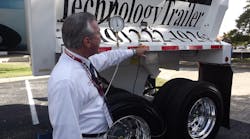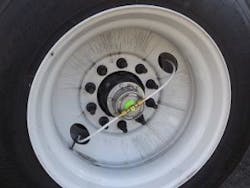SAN ANTONIO. When it comes to CSA violations, tires are a killer. A flat tire is an 8-point deduction; an under-inflated tire is a 3-point hit. But when it comes to roadside inspections, there are significant differences, according to Al Cohn, director of new market development and engineering support for Pressure Systems International (P.S.I.).
Speaking as part of the Meritor and Pressure Systems International 2016 Annual Fleet Technology Event here, Cohn noted that the law stipulates that a flat tire is any tire that measures a PSI at 50% or less of the tire’s stated maximum PSI embossed on the sidewall.
The problem is there is no definition anywhere of what is considered an underinflated tire, so it’s up to an inspector’s judgement, Cohn related. So for fleets without tire inflation systems, and whose drivers do not conduct proper tire pressure checks, it becomes a roll of the dice.
The Meritor Tire Inflation System (MTIS) by P.S.I. provides automatic tire inflation and a warning to drivers that can help eliminate those CSA points. But it is not just inspectors fleets should be wary of, Cohn said, it is also fuel economy. For every 10 PSI a tire is underinflated, there is a 1.5% loss of fuel economy. Underinflated tires are also responsible for 90% of road gators, Cohn added.
“At 70 PSI, 18% more tire touches the road compared to [a tire inflated to] 100 PSI,” Cohn said, and that means more rolling resistance.
Cohn added a few other “benefits” to a tire inflation system such as MTIS by P.S.I., and these include a reduction in tire maintenance, reduction in roadside breakdowns (tires are the number-one reason, he said) and quicker roadside inspections. According to Cohn, CVSA found that vehicles equipped with tire inflation systems saved 17 minutes on average during inspections.
Maintaining tires, though, is not just a priority for P.S.I., they will also be a priority for fleets as Phase 2 of the greenhouse gas regulations take hold in 2018.
Rick Mihelic, program manager of the North American Council for Freight Efficiency, noted that one-third of a fleet’s cost of operation is tied up in fuel. “Fuel economy improvement is always a long-term investment choice,” he said, adding that technologies such as tire monitoring or inflation system are gaining quick acceptance.
“Tire pressure systems have taken off,” Mihelic said. “These are not mandated, but it’s because the marketplace sees value in them.”
MTIS by P.S.I. works by monitoring air pressure in trailer tires and if they are under the cold inflation set point, will pump air from the air brake compressor into the tire until it is properly inflated. Drivers are warned with a light at the front of the trailer that there is a problem so it can be addressed. In-cab warnings are possible and the system also can now be integrated with telematics systems to send real-time notifications to back offices.
For safety reasons, the system will not fill tires if it detects low compressor air totals to ensure proper air brake operation at all times.




